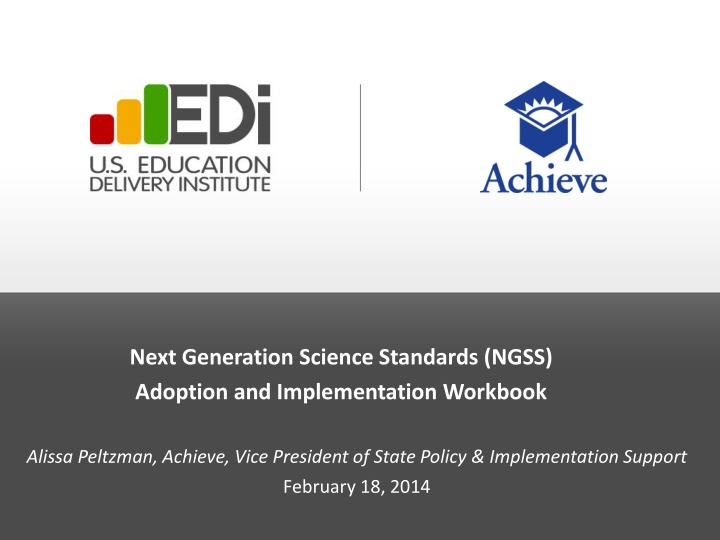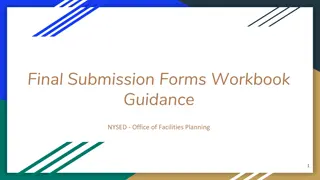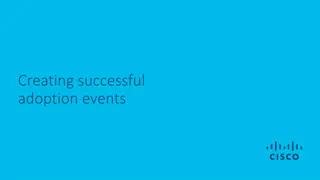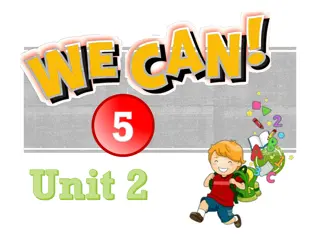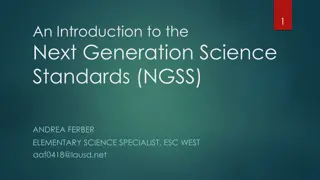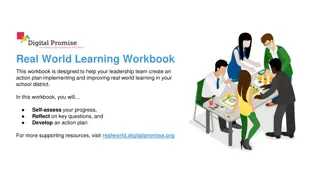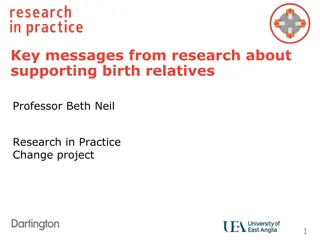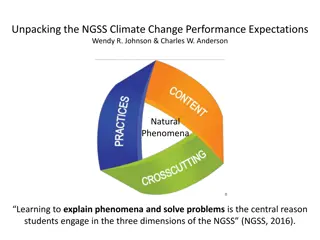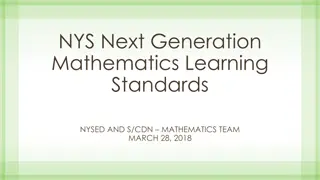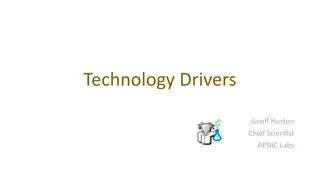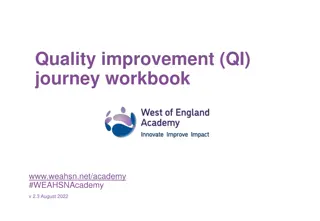Next Generation Science Standards (NGSS) Adoption Workbook Challenges
This workbook delves into the challenges and critical steps for the successful adoption and implementation of the Next Generation Science Standards (NGSS). It provides guidance, exercises, and templates for teams to navigate through each step, including assessing readiness and defining aspirations.
Uploaded on Feb 28, 2025 | 2 Views
Download Presentation

Please find below an Image/Link to download the presentation.
The content on the website is provided AS IS for your information and personal use only. It may not be sold, licensed, or shared on other websites without obtaining consent from the author.If you encounter any issues during the download, it is possible that the publisher has removed the file from their server.
You are allowed to download the files provided on this website for personal or commercial use, subject to the condition that they are used lawfully. All files are the property of their respective owners.
The content on the website is provided AS IS for your information and personal use only. It may not be sold, licensed, or shared on other websites without obtaining consent from the author.
E N D
Presentation Transcript
Next Generation Science Standards (NGSS) Adoption and Implementation Workbook Alissa Peltzman, Achieve, Vice President of State Policy & Implementation Support February 18, 2014
Challenges of implementation Implications for adoption The shifts that the standards will require in the classroom The scale and complexity at which the shifts must take place Equipping and motivating thousands of educators to change their day-to-day practices Ensuring coherence with existing efforts to implement the Common Core State Standards or other College and Career Ready standards in ELA and Math Before they support adoption, policy-makers, educators, stakeholders, and the public will want a clear sense that your system will be able to meet these challenges In particular, they will need to understand your plans and timeline for adoption and implementation, before implementation even begins 2
Critical steps for Adoption and Implementation of the NGSS Evaluate past and present performance Designate a strategic leadership team, Review capacity, and Create a preliminary timeline Define your aspiration Establish routines and solve problems Set targets and trajectories Develop a stakeholder engagement strategy Determine the state s role and approach to implementation 4
The workbook contains guidance, exercises, and templates for teams to use as they work through each step 5
The diagnostic tool helps assess readiness The diagnostic questions are available in the workbook on pages 13-16 6
EXAMPLE: What is an aspiration and why does it matter? An aspiration is a statement that clearly articulates your big-picture goal for NGSS implementation Defining an aspiration will help you: Build the necessary support and coalition for adoption and implementation Ensure common focus and priorities across different stakeholder groups Develop your own deeper understanding of the NGSS one that will anchor decisions about strategy and implementation down the road 8
A good aspiration will answer five questions What are we trying to accomplish for our students and why? 1 How will we know that we have done it? 2 What is holding us back from getting there? 3 Why and how are the NGSS essential to our success? 4 How do the NGSS fit into our overall STEM agenda and more broadly the economic development and growth agenda for our state? 5 9
1 What are we trying to accomplish for our students and why? There are four common reasons to consider: The economic imperative The competition imperative The equity imperative The informed citizen imperative 10
2 How will we know that we have done it? Some examples: Increasing course-taking and passage rates for rigorous science courses at the high school level Improving NAEP science proficiency or proficiency on internationally benchmarked science assessments (e.g. TIMSS) Increasing proficiency over time on science assessments aligned to the NGSS Closing equity gaps between disadvantaged students and their peers on any of the above measures In this step, establish specific goals for science education in the context of your overall goals for education in your state A goal translates the vision defined previously into a series of specific measures **See workbook p. 26 for more examples 11
3 4 Why and how are the NGSS essential to our success? The first three questions set up the problem that NGSS can help solve this question makes the solution explicit This is an opportunity explain, in language that resonates in your state, why the conceptual shifts in the NGSS are essential to improving student achievement What is holding us back from getting there? Once you have established your goals, reflect: What are the greatest areas of weakness in current practice and instruction? How will these things stand in the way of achieving the broad vision you articulated? The answers to both questions should be informed by the conceptual shifts: K-12 science education reflects the real-world interconnections in science All practices and crosscutting concepts are used to teach core ideas all year Science concepts build coherently across K-12 The NGSS focus on a deeper understanding and application of content Science and engineering are integrated in science education from K through 12 Science standards coordinate with the CCSS in English language arts/literacy and mathematics 12
How do the NGSS fit into our overall STEM agenda and more broadly the economic development and growth agenda for our state? 5 Consider how the NGSS fit into your state s broader STEM goals, including: K-12 goals Postsecondary goals Economic goals Business-related goals This step is designed to improve the coherence of the STEM agenda across the state 13
EXAMPLE Exercise: Articulating your NGSS vision What Consider the answers to the five questions for your state and record your responses on flipchart paper What are we trying to accomplish for our students and why? How will we know that we have done it? What is holding us back from getting there? Why and how are the NGSS essential to our success? How do the NGSS fit into our overall STEM agenda and more broadly the economic development and growth agenda for our state? How In state teams Materials Template on workbook p. 29 or digital copy Time 40 14
Next Steps You can download the workbook at: http://www.achieve.org/publications/ngss-adoption-and-implementation- workbook Questions about using the workbook or ideas for improving it? Alissa Peltzman, apeltzman@achieve.org or 202-419-1573 16
